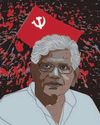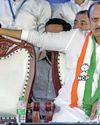
On February 24, when violence broke out at Yamuna Vihar in Delhi, around 60 students were preparing for competitive exams at Horizon Academy, one of several coaching institutes lining National Highway 9. After burning down a neighbouring petrol pump, the rioters began targeting the academy. They broke its window panes, but could not force open the wooden door. Inflamed, the angry mob began torching vehicles outside.
Trapped inside were students and staff, Hindus and Muslims. “It was harrowing,” said Navneet Gupta, who owns Horizon Academy. “Many students were crying. Four or five policemen were with us; they had taken shelter [from the violence]. We asked them if they would go out and control the riot. They said they would rather stay inside. It was only in the evening, when the streets fell silent, that the policemen went out.”
Workers at the petrol pump told a similar story. “There were many policemen outside when the mob came,” said Ramnath Mishra, a security guard. “As the rioters grew in number, the policemen and a few employees climbed a wall and escaped.”
After the rioters faced retaliation, they began targeting shops of Muslims. Haji Shareef Ahmed, who sold automobile spare parts and electric rickshaws at Bhajanpura, said that his shops were torched as the police dragged its heels. “I lost more than ₹60 lakh,” he said.
The delay in police action is a common thread in stories of Delhi’s worst riots in 35 years. Policemen told THE WEEK that they feared being lynched by the mobs. There were two full days of violence before the police finally cracked the whip and imposed Section 144 of the Code of Criminal Procedure on riot-hit areas.
Denne historien er fra March 15, 2020-utgaven av THE WEEK.
Start din 7-dagers gratis prøveperiode på Magzter GOLD for å få tilgang til tusenvis av utvalgte premiumhistorier og 9000+ magasiner og aviser.
Allerede abonnent ? Logg på
Denne historien er fra March 15, 2020-utgaven av THE WEEK.
Start din 7-dagers gratis prøveperiode på Magzter GOLD for å få tilgang til tusenvis av utvalgte premiumhistorier og 9000+ magasiner og aviser.
Allerede abonnent? Logg på

A golden girl
One of India's most formidable beauties passed away earlier this month. The odd thing is she would absolutely hate this obituary; she hated being written about and avoided publicity for all of her nine decades. Indira Aswani was 93 when she died. But anyone who encountered her, even briefly, was in such awe of her grace and poise, and one could not but remember her forever.

The interest in wine is growing delightfully in India
The renowned British wine writer and television presenter Jancis Robinson, 74, recently came to Delhi and Mumbai to reacquaint herself with India's wine industry. This was the Robinson's fourth visit to India; the last one was seven years ago. On this trip, Robinson and her husband, restaurateur Nicholas Lander, were hosted by the Taj Hotels and Sonal Holland, India's only Master of Wine.

United in the states
Indian-Americans coming together under the Democratic umbrella could get Harris over the line in key battlegrounds

COVER DRIVE
Usage-driven motor insurance policies offer several benefits

GDP as the only measure of progress is illogical
Dasho Karma Ura, one of the world's leading happiness experts, has guided Bhutan's unique gross national happiness (GNH) project. He uses empirical data to show that money cannot buy happiness in all circumstances, rather it is family and health that have the strongest positive effect on happiness. Excerpts from an interview:

India is not a controlling big brother
Prime Minister Tshering Tobgay considers India a benevolent elder sibling as the \"big brotherly attitude\" is happily missing from bilateral ties. He thinks the relationship shared by the two countries has become a model of friendship not just for the region, but for the entire world. \"India's attitude is definitely not of a big brother who is controlling and does not allow the little brother to blossom and grow,\" says Tobgay in an exclusive interview with THE WEEK.

Comrade with no foes
Lal Salaam, Comrade Yechury-you were quite a guy!

Pinning down saffron
In her first political bout, Vinesh Phogat rides on the anti-BJP sentiment across Haryana

MAKE IN MANIPUR
Home-made rockets and weapons from across the border are escalating the conflict

SAHEB LOSES STEAM
Coalition dynamics and poor electoral prospects continue to diminish Ajit Pawar's political stock